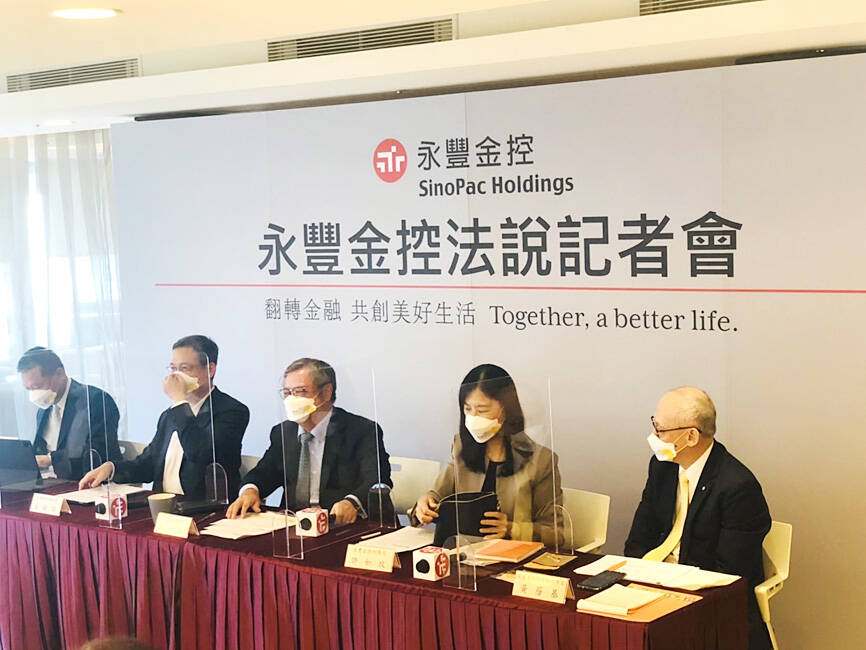SinoPac Financial Holdings Co’s (永豐金控) banking and securities units reported mixed performance for the first half of the year, as rate hikes worldwide boosted the bank’s interest-based income, but also affected global stock markets, the company told an investors’ conference in Taipei yesterday.
Bank SinoPac’s (永豐銀行) net income grew 27 percent to NT$7.5 billion (US$246.43 million) for the first six months, as its net interest income reached a record-high NT$6.68 billion in the second quarter, while first-half interest income expanded 17.2 percent year-on-year to NT$12.56 billion, the bank said.
Its profitability gauge, net interest margin (NIM), rose to 1.19 percent at the end of June, up from 1.07 percent at the end of March and compared with 1.04 percent a year earlier, thanks to central banks’ interest rate hikes, it said.

Photo: Kelson Wang, Taipei Times
“We expect our NIM to grow by at least 10 basis points for the whole of this year, from the end of last year,” Bank SinoPac president Eric Chuang (莊銘福) said.
Despite weakening financial markets, which generally lead to a decline in a bank’s wealth management business, SinoPac’s wealth management unit posted 3 percent annual growth in net fee income, it said.
In contrast, SinoPac Securities Co’s (永豐金證券) net income plunged 63 percent to NT$892 million for the first half of the year, while capital gains plummeted 85 percent to NT$106 million and revenue dropped 22 percent to NT$4.69 billion, as local equities performed poorly, company data showed.
The securities firm attributed the fall in net income to a double-digit percentage drop in stock market turnover in the first half of the year.
In the first six months, SinoPac Financial’s net income fell 4.2 percent to NT$8.22 billion from a year earlier, it said.
However, its cumulative net income in the first seven months had already returned to positive territory, at NT$10.31 billion, making it the only financial holding firm among its local peers to do so, president Stanley Chu (朱士廷) said.
The company also expects the central bank to continue to raise rates this month, and the US Federal Reserve’s hawkish comments last week indicated that it would continue rate hikes, Chu said.
“Investment will be more difficult by the end of the year, so we will stick to a conservative approach,” he said.

GROWING OWINGS: While Luxembourg and China swapped the top three spots, the US continued to be the largest exposure for Taiwan for the 41st consecutive quarter The US remained the largest debtor nation to Taiwan’s banking sector for the 41st consecutive quarter at the end of September, after local banks’ exposure to the US market rose more than 2 percent from three months earlier, the central bank said. Exposure to the US increased to US$198.896 billion, up US$4.026 billion, or 2.07 percent, from US$194.87 billion in the previous quarter, data released by the central bank showed on Friday. Of the increase, about US$1.4 billion came from banks’ investments in securitized products and interbank loans in the US, while another US$2.6 billion stemmed from trust assets, including mutual funds,

AI TALENT: No financial details were released about the deal, in which top Groq executives, including its CEO, would join Nvidia to help advance the technology Nvidia Corp has agreed to a licensing deal with artificial intelligence (AI) start-up Groq, furthering its investments in companies connected to the AI boom and gaining the right to add a new type of technology to its products. The world’s largest publicly traded company has paid for the right to use Groq’s technology and is to integrate its chip design into future products. Some of the start-up’s executives are leaving to join Nvidia to help with that effort, the companies said. Groq would continue as an independent company with a new chief executive, it said on Wednesday in a post on its Web

JOINT EFFORTS: MediaTek would partner with Denso to develop custom chips to support the car-part specialist company’s driver-assist systems in an expanding market MediaTek Inc (聯發科), the world’s largest mobile phone chip designer, yesterday said it is working closely with Japan’s Denso Corp to build a custom automotive system-on-chip (SoC) solution tailored for advanced driver-assistance systems and cockpit systems, adding another customer to its new application-specific IC (ASIC) business. This effort merges Denso’s automotive-grade safety expertise and deep vehicle integration with MediaTek’s technologies cultivated through the development of Media- Tek’s Dimensity AX, leveraging efficient, high-performance SoCs and artificial intelligence (AI) capabilities to offer a scalable, production-ready platform for next-generation driver assistance, the company said in a statement yesterday. “Through this collaboration, we are bringing two

Even as the US is embarked on a bitter rivalry with China over the deployment of artificial intelligence (AI), Chinese technology is quietly making inroads into the US market. Despite considerable geopolitical tensions, Chinese open-source AI models are winning over a growing number of programmers and companies in the US. These are different from the closed generative AI models that have become household names — ChatGPT-maker OpenAI or Google’s Gemini — whose inner workings are fiercely protected. In contrast, “open” models offered by many Chinese rivals, from Alibaba (阿里巴巴) to DeepSeek (深度求索), allow programmers to customize parts of the software to suit their